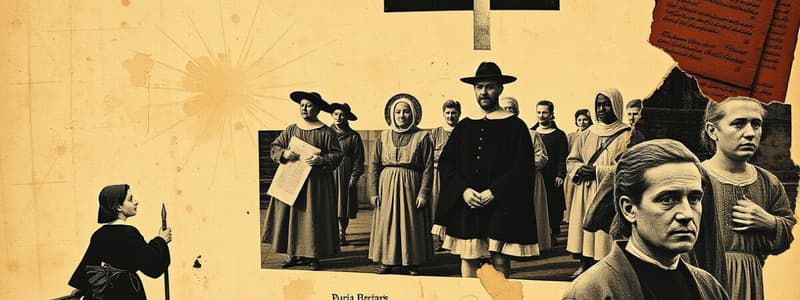Podcast
Questions and Answers
What method did Cotton Mather advocate during the smallpox epidemic in Boston?
What method did Cotton Mather advocate during the smallpox epidemic in Boston?
- Herbal remedies
- Inoculation (correct)
- Bloodletting techniques
- Quarantine practices
How did the introduction of European diseases affect Native American populations?
How did the introduction of European diseases affect Native American populations?
- They caused no significant impact.
- They resulted in devastating epidemics. (correct)
- They improved the health of some tribes.
- They led to the establishment of stronger trade relations.
What was the Mayflower Compact primarily intended to outline?
What was the Mayflower Compact primarily intended to outline?
- A social contract for survival
- A self-governance system (correct)
- An economic plan for trade
- A religious doctrine
Which of the following best describes the Puritan approach to governance?
Which of the following best describes the Puritan approach to governance?
What did Deists emphasize in their beliefs?
What did Deists emphasize in their beliefs?
What was a significant characteristic of the encounters between Europeans and Native Americans?
What was a significant characteristic of the encounters between Europeans and Native Americans?
What aspect of the Enlightenment did Benjamin Franklin embody?
What aspect of the Enlightenment did Benjamin Franklin embody?
How did European explorers contribute to misconceptions about Native Americans?
How did European explorers contribute to misconceptions about Native Americans?
What primary purpose did the covenant between God and humanity serve for the Puritans?
What primary purpose did the covenant between God and humanity serve for the Puritans?
Which group focused primarily on scientific inquiry and rational thought during the Enlightenment?
Which group focused primarily on scientific inquiry and rational thought during the Enlightenment?
What was one of the main goals of the Puritans when they journeyed to Plymouth?
What was one of the main goals of the Puritans when they journeyed to Plymouth?
Which characteristic was NOT emphasized by the Puritans in their society?
Which characteristic was NOT emphasized by the Puritans in their society?
Deists rejected which concept associated with the Puritan worldview?
Deists rejected which concept associated with the Puritan worldview?
How did Rationalists view God?
How did Rationalists view God?
What was the primary basis for Deistic beliefs?
What was the primary basis for Deistic beliefs?
Which of the following was a significant outcome of Rationalism during the Enlightenment?
Which of the following was a significant outcome of Rationalism during the Enlightenment?
Which Puritan belief differentiated them from Deists?
Which Puritan belief differentiated them from Deists?
What did Deists believe was the best way to worship God?
What did Deists believe was the best way to worship God?
Flashcards are hidden until you start studying
Study Notes
Puritans and Their Journey
- Early 17th century English Protestant Christians known as Puritans sought religious freedom in Plymouth, New England.
- Aimed to practice a personal interpretation of the Bible as the literal word of God.
- Beliefs included predestination and a view of God as an active, mysterious force in the universe.
Puritan Values
- Emphasized self-reliance, industriousness, temperance, and simplicity.
- These qualities were considered essential for building their new society.
Emergence of Deism
- Deism emerged in the 18th century, offering an alternative to Puritan beliefs.
- Accepts a creator God but rejects the idea of divine intervention in daily life.
- Deists rely on reason and nature rather than religious revelation.
- Advocated for ethical behavior as the best form of worship, emphasizing the happiness of God’s creations.
Rationalism and Its Influence
- Rationalism compared God to a clockmaker; sets the universe in motion to operate under natural laws.
- Highlighted the importance of logic and reason over faith or intuition.
- Contributed to the philosophical foundations of the Age of Reason, impacting the American Revolution and the Declaration of Independence.
Cotton Mather and Science
- Cotton Mather, a Puritan minister, exemplified the blend of faith and scientific inquiry.
- Advocated for smallpox inoculation during a Boston epidemic, learned from Turkish practices.
- Overcame public opposition, significantly reducing mortality rates, showcasing Puritan engagement in public health.
The Aztec Empire
- The Aztec Empire represented a significant Native American civilization in the 15th century Mexico.
- European explorers documented rich early encounters, highlighting both shared curiosity and European supremacy.
Early Encounters between Europeans and Native Americans
- Initial interactions involved mutual reliance; Europeans learned survival skills from Native Americans.
- Indigenous peoples were introduced to European goods, including firearms and textiles.
- European diseases caused severe epidemics, drastically affecting Native American populations and societies.
Puritan Governance
- Puritans aimed to purify the Church of England and established a society based on Biblical principles.
- Created the Mayflower Compact to implement a self-governance system.
- Governance intertwined with their religious beliefs about the covenant between God and humanity, influencing early American democracy.
The Salem Witch Trials
- The fear of moral decay within the Puritan community revealed their often undemocratic governance approaches.
Differences Between Ideologies
- Deists emphasized non-interventionist creationism and moral living, differing from Puritan strictness.
- Rationalists promoted reason and logic in understanding the world, contrasting with the Puritan emphasis on faith.
Benjamin Franklin and American Enlightenment
- Benjamin Franklin embodied the rationalist spirit, depicting virtues of self-made success in his autobiography.
- His influence, along with Deist and rationalist philosophies, shaped American political thought and societal values.
Studying That Suits You
Use AI to generate personalized quizzes and flashcards to suit your learning preferences.




